 Television evangelist Pat Robertson once described feminism as “a socialist, anti-family, political movement that encourages women to leave their husbands, kill their children, practice witchcraft, destroy capitalism, and become lesbians.” His comment is frequently used as a particularly extreme version of the feminist stereotype, but how far are his sentiments from those of the general public?
Television evangelist Pat Robertson once described feminism as “a socialist, anti-family, political movement that encourages women to leave their husbands, kill their children, practice witchcraft, destroy capitalism, and become lesbians.” His comment is frequently used as a particularly extreme version of the feminist stereotype, but how far are his sentiments from those of the general public?
A more systematic investigation into what people think about feminists found that many people think that feminists are ugly, uptight, angry, aggressive, harsh, strident, demanding, dogmatic, man-hating lesbians… or think other people think they are. Only 26 percent of people say that feminist is a positive term.
This suggests that actual feminists have lost control over their own reputation. It would be counterproductive, after all, for feminists to portray themselves as unlikeable. Negative stereotypes about feminists, instead, are likely spread by anti-feminists.
Anti-suffrage campaign material is one example. The images below — from the collection of Catherine Palczewski — tell a story about who the feminist women fighting for suffrage are and what they want. It’s all pre-1920s, but the stereotypes and fears are similar.
Feminists are ugly:
Feminists neglect their natural role as a mother/are uncaring toward children: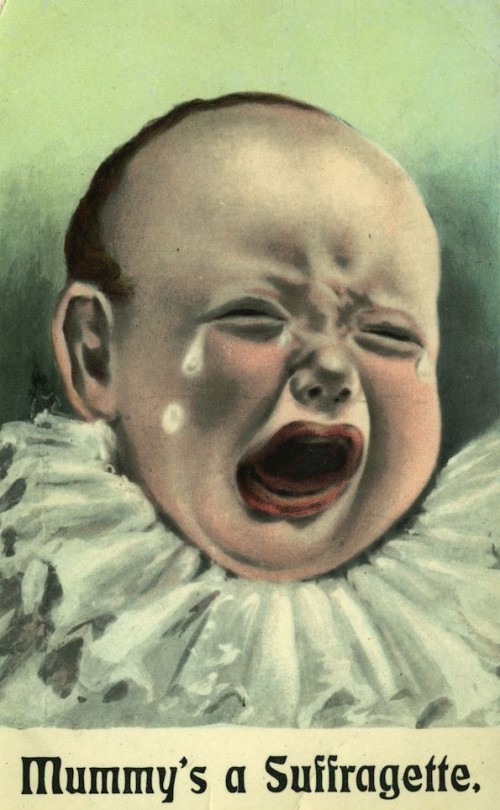
They want to emasculate men and take their role: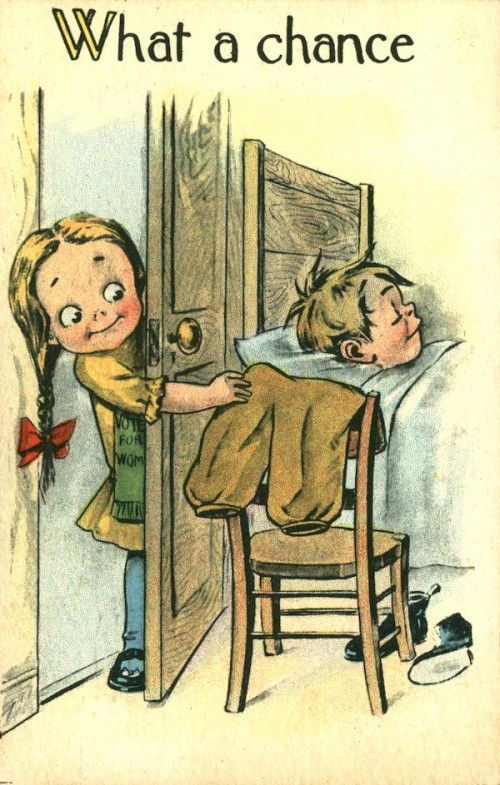
They’re mean to their husbands, if they can get married at all: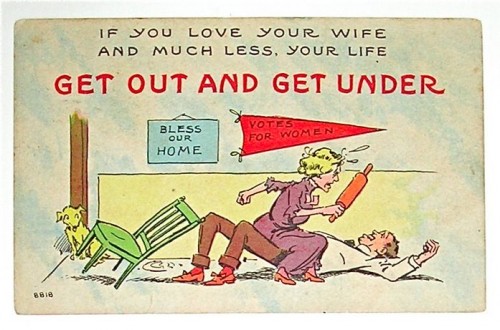
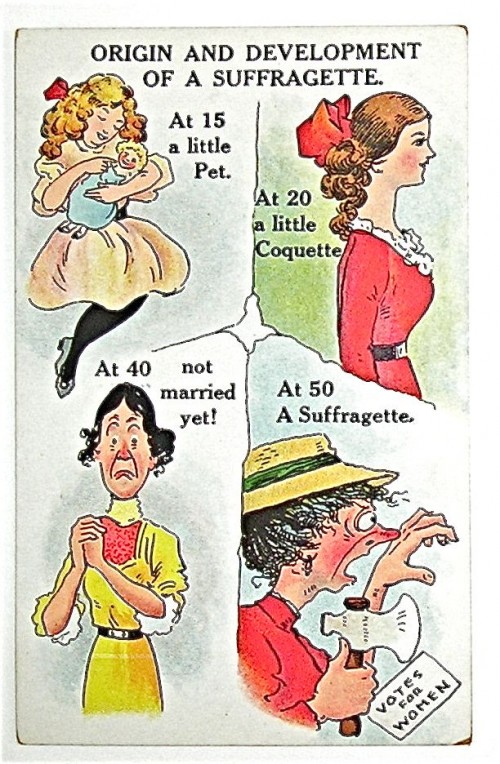
They don’t want equality with men, they want to dominate them: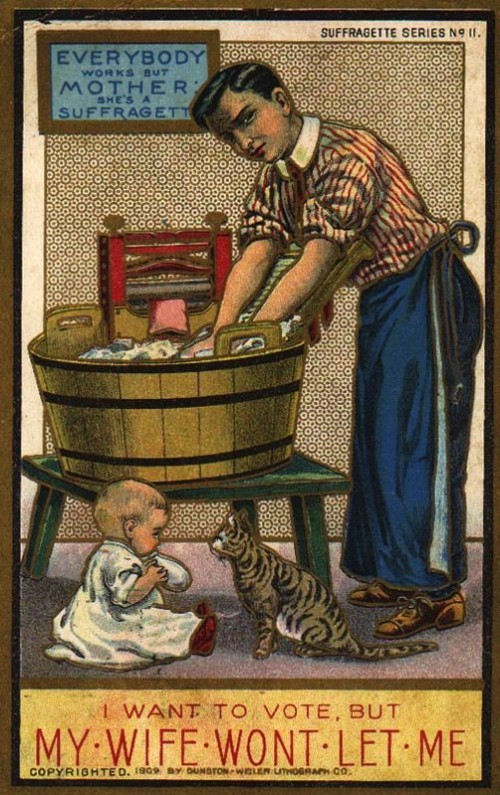
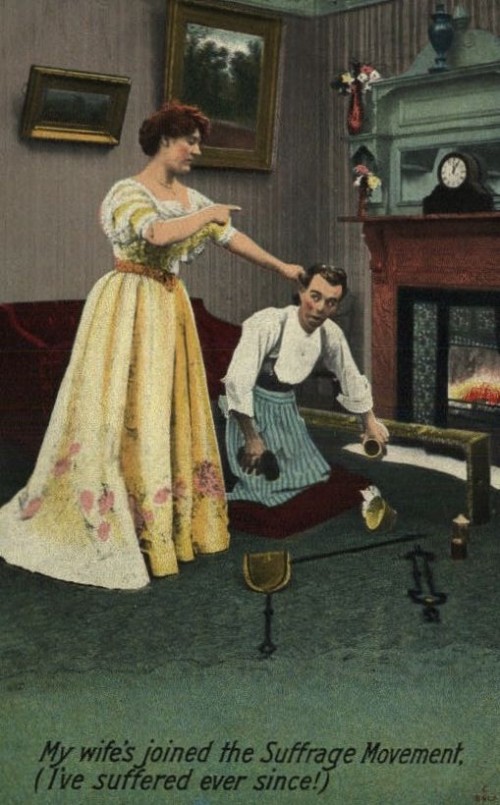
Next time you hear that feminists are ugly or hate men — or any number of stereotypes about women who seek equality — remember that this is exactly what anti-feminists have wanted you to think for the last 200 years.
Thanks to Jay Livingston for the tip! Postcards from: Palczewski, Catherine H. Postcard Archive. University of Northern Iowa. Cedar Falls, IA.
Lisa Wade, PhD is an Associate Professor at Tulane University. She is the author of American Hookup, a book about college sexual culture; a textbook about gender; and a forthcoming introductory text: Terrible Magnificent Sociology. You can follow her on Twitter and Instagram.
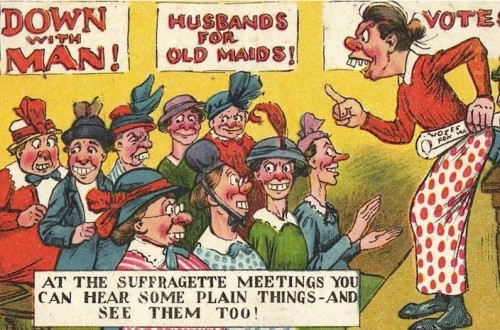
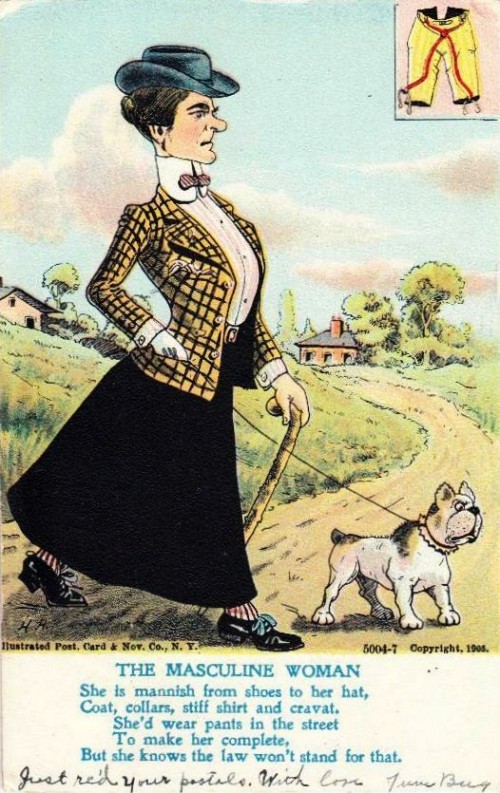
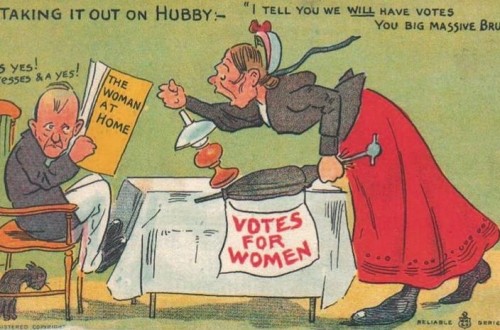
Comments 116
fork — February 2, 2015
I like the total lack of awareness of what they're saying in the last two:
"Everybody works but Mother: she's a suffragette." with a guy doing housework and looking after a baby.
"I want to vote, but my wife won't let me."
". . .I've suffered ever since" with a guy doing housework.
Huh. So housework and childcare *is* work. And it sucks to be the person all that work gets dumped on. And to not be allowed to vote when you want to. How terrible. Maybe we should agitate for social change so nobody's in that awful, awful position.
Japaniard — February 2, 2015
Can someone help me out here, it seems that some of these images imply it was ILLEGAL for women to wear pants, ever? Is this true, and if so where can I read more?
ViktorNN — February 2, 2015
Interest groups who want large-scale change often lose control of their image, and not just due to their opponents getting over on them. One of the most common ways it happens, for example, is extremists within the movement will have radical views that aren't communicated well to the public, or are just flat out not wanted by the public. The radical views of the minority end up tarnishing the image of the larger movement. It happens all the time.
Given this, blaming all of feminisms' PR problems on "anti-feminists" (whoever they are - the only avowedly anti-feminist groups I know of are utterly marginal and powerless compared to feminists) is obviously silly.
Jason J. Shaw — February 2, 2015
Some of the negative stereotypes of feminists these days comes from so-called "feminists" that step beyond the realm of equality and demand that women be given rights superior to those of men under the guise of equality.
Music Monday: In which I misuse Tom Petty – Bridget Magnus and the World as Seen from 4'11" — February 3, 2015
[…] the Transatlantic Trade and Investment Partnership; yeah, that ain’t happening; no kidding; stereotypes; and […]
Where Do Negative Stereotypes About Feminists Come From? - Treat Them Better — February 3, 2015
[…] Where Do Negative Stereotypes About Feminists Come From? […]
John — February 3, 2015
Andrea Dworkin did a pretty decent job at creating negative stereotypes about feminism.
Mujerist@ — February 3, 2015
This is rather disappointing and pretty simple. I guess this is a good post if you live in a middle-class or above world, and are white (like all the images presented on this entry).
You're highlighting the obvious, and looking at it from a mainstream perspective. I guess I wish this would have dealt with the other stereotypes that some feminists get: racism, transphobia, classism, Islamophobism, co-opting different struggles of oppression, etc.
Bill R — February 3, 2015
WHERE DO NEGATIVE STEREOTYPES ABOUT FEMINISTS COME FROM?
They come from the interactions between people who are threatened by change and those who angrily demand it.
Larry Charles Wilson — February 3, 2015
The question to be asked is how these comic postcards actually influenced men and women in their attitudes and actions.
DonnaDiva — February 4, 2015
Here are some things that Andrea Dworkin actually said: http://www.nostatusquo.com/ACLU/dworkin/MoorcockInterview.html
I really don't find anything so man-hating or sex-negative in them. Having read many of her works, I have never understood the hatred and slander heaped upon her.
Lovely Links: 2/6/15 - Already Pretty | Where style meets body image — February 6, 2015
[…] Where do negative stereotypes about feminists come from? […]
aderjay — February 8, 2015
but but but... they are all true! lol
Where Do Negative Stereotypes About Feminists Come From? | Koolnews Blog — February 9, 2015
[…] Source: thesocietypages.org […]
Sunday Morning Medicine | Nursing Clio — February 15, 2015
[…] Where do negative stereotypes about feminists come from? […]
Tim Wright — February 18, 2015
I think it is important to note that the anti-suffragist imagery was not merely a reaction to women's demand for the vote. Rather, at the time, woman's suffrage was so entangled with the prohibition movement that the beer, wine, and liquor industries were pouring inordinate amounts of money into campaigns that demonized suffragists and tied any political gains for women as losses for men. The brewers and liquor interests pushed misogyny because it was profitable to do so and protected their bottom line. Does this sound familiar? (Oh, by the way, the liquor interests also often asserted that they were acting in women's best interests as the women were misled and didn't know what they were doing.)
Open Thread And Link Farm: The Dress Is Bigger On The Inside Edition | Alas, a Blog — February 18, 2015
[…] Anti-Feminist stereotypes about feminists haven’t changed much in 200 years, as these old poli… […]
Gus M. Parker — February 19, 2015
I'm defined as a feminist and maybe I'm out of the loop from living in the NE my who life. The negative things I see in feminism is a lot like veganism, people are passionate about that label in a way that they don't look at how others are are also human and will jump down someone's throat because of the minute differences in opinion. .
Last of all lets work on terms that works for everyone, not just stereotypical "white women" How about the term: Enlightenist! Until we find a term or use that term answer me these questions that must make me sexist, immature or slow because I have thought about them in a different way.:
Do "health vegans" qualify as vegans?Technically yes.
Does showing skin like in Halloween costumes, having casual sex, or wanting a masculine man make you any less equal? no.
Its terrible to call someone a "girl", and "women" or some of the first inhabiting people in America "Indians" because they identify them selves as them? Don't give me the belittling argument.
Women should be out of the household and into the workplace! Sexist, I know a liberal atheist punk rock feminist that was the main one to raise the kid through early childhood. and a conservative full time stay at home that is more than happy.
Why are women always the victims of catcalling, bossy and rape and how can we keep the arguments focused on them not men? That is a sexist question, I have been the victim of all three (side note my mom called my bossy, and told me to smile).
Finally I'm betting 10/1 feed back on my thoughts are going to be negative ones.
Jeannie Boudreau Richards — February 19, 2015
It's amazing how many people shy away from being labeled as "feminists" because of the press's sensationalistic coverage of the radical feminist movement of the 60's and early 70's. This movement reflected the times, when significant changes in the push for women's rights - such as equal pay for equal work and the right to serve in the military - were successfully gained, but the general view of the "women's movement" was tarnished by many who thought it's main headliner supporters were overzealous and sometimes violent. In the end, feminism left a bad taste in the nation's mouth.
Since those early decades when feminism became a national movement, it has been hard for feminists to overcome that negative image of women running amok in the streets burning their bras. It is only within the last few decades that feminists have graduated to a more level-headed, socio-political agenda. The issues are basically the same as they were in those early days of feminist marches and sit-ins, but the manner in which change is being sought and instituted is more mainstream than radical.
Because of the negative connotation that the term "feminist" gained in the past, and the current lack of media put out to educate the public on today's women's rights movement, the term "feminist" has continued to have a bad
name. It's not just men who are confused about what it means to be a feminist and support feminism, I've encountered many women who balk at the term because they associate feminism with the same sort of radical party touting bra burning and man-beating. There is a lot of work to be done to change the present misconception of what it means to be a feminist, and impromptu surveys like this one prove that we still have a long, long way to go.
Thanks so much for posting this article! I will definitely be sharing this on my author's page today!
JB Richards
Author of
"Miriamne the Magdala-The First Chapter in the Yeshua and Miri Novel
Series" and Content Creator for The Miriamne Page
https://www.facebook.com/pages/Miriamne-the-Magdala-First-in-the-Series-of-the-Yeshua-Miri-Novels/206903979347028
kofybean — February 20, 2015
What makes a feminist radical? There is no standard measure of equality that feminist have put forth, nor is there a standard authority figure that has the means to approve or denounce a feminist. Every time I've argued with a feminist they always claim that whatever another feminist does that makes them look bad isnt really a feminist. Its the No True Scottsman all over the place.
One feminist says everyone who doesn't believe in her brand of feminism isnt a true feminist, and the other says the same thing.and neither has authority. The funny, and infuriating, thing about this article is that it claims the negative stereotype of feminist is yet again... the fault of men. At the very least, the fault of criticism no one in this century has seen or heard. It is the one argument all feminist are good at. "Its not my fault."
Because is it really impossible that anyone's negative views about feminism came from observing actual feminist? Or are feminist the one special group in all of human history above criticism? Feminist is the one ideal in all of Earth's history that has zero philosophical contradictory arguments? Please.
Trage emancipatie roept frustratie op | De Zesde Clan — February 26, 2015
[…] de schuld geven. Dat komt vaak neer op feministen terug in hun hok slaan. In Nederland, maar ook in de V.S., gebruiken mensen als knuppel al minstens sinds de strijd om het kiesrecht vijandige stereotypen […]
May the 2016 Elections Be Full of Angry Women Politicians | Central Oregon Coast NOW — March 5, 2015
[…] word that women in politics are accustomed to, it’s ‘angry’. Throughout history – from American suffragists to those in office today – women’s strong feelings about politics have long been treated […]
May the 2016 Elections Be Full of Angry Women Politicians | Daily Queer News — March 6, 2015
[…] word that women in politics are accustomed to, it’s ‘angry’. Throughout history – from American suffragists to those in office today – women’s strong feelings about politics have long been treated […]
daboys1215 . — March 6, 2015
Anti-feminists were right 200 years ago and we are still right today.
Some thoughts on International Women’s Day | Content Cookie Stuff — March 8, 2015
[…] References http://thesocietypages.org/socimages/2015/02/02/where-do-negative-stereotypes-about-feminists-come-f… […]
Wednesdays Reads: Elephants and Landmines, a Seemingly Awful Combination. | Sky Dancing — March 15, 2015
[…] taunts thrown at feminists – and one of the oldest – is “manhater”. It’s been around since the days of suffrage, and still gets used today, though its a pretty anodyne insult. Most feminists, like me, shun the […]
Understanding Antifeminism | University of Minnesota Women's Center Blog — April 6, 2015
[…] order” of being wife and mother and with the intent to dominate men, among other things. When the first wave feminists challenged the “natural order” for the right to vote, […]
“Feminist” is not a bad word – damagecontrol7media — April 13, 2015
[…] portrayals of feminism have run rampant through society for a very long time. Change scares people, and those who are comfy in the seat they’re in don’t want to consider […]
The Problem With Feminism | twirliegirly — July 10, 2015
[…] believe and how women perceive a feminist to be. There were the blog articles which suggest reasons why the negative stereotypes of feminists may exist, accessible and understated posts about what a feminist is (and why it’s important to know […]
Causeur – suite | So Dame — July 22, 2015
[…] Visuels : Couverture de Causeur & images d’illustration de « Where Do Negative Stereotypes About Feminists Come From? » […]
Ceara — August 5, 2015
Where do negative stereotypes about feminists come from? How about the KillAllMen hashtag? How about Andrea Dworkin and her anti-men quotes? How about Valerie Solanas and her SCUM manifesto? How about gender studies professors teaching our young people that men need to be "taught not to rape?" How about the feminists who carry on about "toxic masculinity?"
How about the feminist who wrote the Dear Colleagues letter that resulted in Universities using a "preponderance of evidence" when dealing with sexual assault on campus, a change that has resulted in SEVERAL young men being expelled from University, being attacked and bullied, or having their lives ruined when they have done NOTHING wrong.
How about the "male tears" mugs that have become so popular in the feminist community? How about the LARGE group of feminists who showed up to a men's rights conference, shouted through megaphones, and pulled a fire alarm to STOP the men's rights conference?
How about the feminists who attacked, bullied, and threatened Erin Pizzey, the woman who created one of the FIRST DV shelters, because she had the nerve to suggest that men are not always SOLELY to blame in violent relationships.
How about the feminist who was responsible for the Tender Years Doctrine, which resulted in MOTHERS being seen as the default caregiver for the children, which, in turn, resulted in fathers having few to no rights in regards to their children.
Negative stereotypes about feminists come from feminists. Tell your feminist sisters to stop ACTING like raging misandrists and people won't think they ARE raging misandrists. When your movement has accomplished pretty much nothing BESIDES unjust and unequal changes, is it any wonder no one believes you when you say you are for gender equality?
"Quando mulheres odeiam homens, os ofendemos. Quando homens odeiam mulheres, nos matam." | Lado Direito da Equidade — October 16, 2015
[…] taunts thrown at feminists – and one of the oldest – is “manhater”. It’s been around since the days of suffrage, and still gets used today, though its a pretty anodyne insult. Most feminists, like me, shun the […]
Listas (I): Sexismo y roles de género | ℵ-1 — October 28, 2015
[…] Where do negative stereotypes about feminists come from? […]
Summer — December 29, 2015
Stereotypes are there because there is a lot of truth in them. Not all, of course, but a disproportionately large % of feminists are angry, very unattractive, bitter, with a huge chip on their shoulder towards males, children and the traditional family - especially so when they see the enormous privilege given to their attractive female counterparts which they are excluded from.
11 Vintage Images Reveal Where Negative Stereotypes About Feminists Come From « CauseHub — December 31, 2015
[…] a recent Sociological Images article, Wade pointed out that many of these enduring and damaging stereotypes may have originated from the […]
ted_2012 — January 3, 2016
- "His comment is frequently used as a particularly extreme version of the feminist stereotype" - Used by whom exactly?
- "Negative stereotypes about feminists, instead, are likely spread by anti-feminists." - Anti-feminists don't need to "spread" anything. All they do is appeal to what feminists have actually said and done. It would perhaps be more productive to address what those particular feminists do and say, as it doesn't nullify anyone's concerns of feminists by saying that it is merely propaganda spread by anti-feminists.
- Also, I'm going to bet-my-bottom-dollar that the reason why most people have lost their patience with feminists is not because of those pictures (most of them have more than likely never seen them before in their life) but from experience.
fidelbogen — January 9, 2016
Where do negative stereotypes about feminists come from?
That's easy. They come from the behavior of feminists themselves.
11 Vintage Images Reveal Where Negative Stereotypes About Feminists Come From | women times — January 11, 2016
[…] a recent Sociological Images article, Wade forked out that many of these fast and deleterious stereotypes might have originated from a […]
Femminismo: una parola che non piace. Perchè? | Un Altro Genere Di Rispetto — January 29, 2016
[…] hanno provato a lottare per conquistare i primi diritti basilari, ad esempio, il diritto di voto. Queste immagini risalgono a prima degli anni ’20 e fanno parte della campagna anti-suffragio […]
If You Want Men To Be Feminists, Stop Saying These 5 Things To Them | News And trends — April 2, 2016
[…] man-hating, angry ladies. Evangelical windbag Pat Robertson describes his views on feminism in an interview as, “A socialist, anti-family, political movement that encourages women to leave their husbands, […]
Kim Kardashian Is a Feminist, Even If She Doesn't Like the Word |Heat Street — August 17, 2016
[…] excuse every time she’s confronted with the question. That’s probably because the word “feminist” is itself a loaded term, and one that modern women (and men, for that matter) rightfully associate with a very specific […]
Ugly, hateful, lonely – feminist stereotypes I come across every day — September 28, 2016
[…] armpits, spinsters that are too ugly to get a man, uptight career women, man-hating lesbians, and other classic examples readily provided for us by anti-feminists since 19th century, let me focus on those stereotypes I’ve been hearing most often from the mouths of young educated […]
A Prayer to Future Feminists – Whispering Bodies — March 6, 2017
[…] today, much of our popular culture perpetuates inaccurate and problematic stereotypes of feminism and feminists (or straight up lies). When something is discredited, it’s harder for people to […]
The Negative Portrayal of Feminism in the Media – The Mentality Behind Journalism — March 25, 2017
[…] Clear examples of what I am referring to can be found in this link: https://thesocietypages.org/socimages/2015/12/28/where-do-negative-stereotypes-about-feminists-come-… […]
Seder Singh — December 8, 2019
Android, iOS, Windows, Mac, https://dltutuapp.com/tutuapp-download/ Chromecast and more platforms. Free download the official Kodi TV App with step by step guide.
Kuko Das — December 8, 2019
It has compiled all the digital https://showbox.run/ media in the user-friendly interface which is easily accessible to the users.
Mario Carpenter — August 21, 2020
Now the question of finism is very popular, girls are fighting for their rights and rightly so. My favorite book is Kate Chopin and her History of the Hour, first published in 1894. There is an interesting article on this topic https://newswatchtv.com/2020/07/28/literary-criticism-story-hour/ which I really liked. It is doubtful to study, revise and analyze it without examining the context more thoroughly. It is also worth noting that Chopin's pioneering ideas on the use of irony were groundbreaking for critics and early readers alike.
Sustainability Issues That Jumped From The Bench To The Sport, And One That Is About To - Businessconstruct — February 13, 2022
[…] generations of females, their requires equality have been dismissed as unnatural and uncaring, and firms and makes steered distinct. But at the moment, feminism is nonetheless a wrestle, […]
Sustainability Issues That Jumped From The Bench To The Game, And One That Is About To - Digital News Today — February 13, 2022
[…] generations of women, their calls for equality were dismissed as unnatural and uncaring, and corporations and brands steered clear. But today, feminism is still a fight, but one played […]
Sarah77 — September 16, 2022
Such stereotypes lead to the fact that women more and more often choose new trends in social behavior. Only those who are completely free can build their own destiny without restrictions. Maybe this is the meaning of the great demand among married women dating - https://www.nastyhookups.com/married/women.html I support the moment where women themselves decide with whom they meet and with whom they live together. This is right.
alligatorexist — March 12, 2024
yeah, i think the same like Fireboy and Watergirl
alinasdwenn — September 30, 2024
This was a fantastic read! Your posts are always so insightful and easy to relate to thank you Chicago jacket
James Kole — January 29, 2025
I love supporting brands that truly care about craftsmanship, and Jacket Artisan is definitely one of those brands. Their leather jackets are absolute works of art!
david — June 5, 2025
Upgrade your wardrobe with timeless style and unmatched comfort. Discover our exclusive collection of premium jackets—crafted for every season and every adventure. From sleek leather designs to bold statement pieces, we’ve got your perfect fit.
Detective Costume Yellow
Jonyys nin — July 18, 2025
So motivating! This post is exactly what I needed to hear. I’ve been procrastinating on my goals Miami Jackets, and your advice on breaking tasks down made them seem more manageable. I’m feeling motivated to take action now. Appreciate the encouragement!
Emille Evan — October 1, 2025
The Wrong Paris Movie Outfit Collection mixes romance, comedy, and surprising twists. A woman joins a Paris dating show with excitement. She discovers the show is actually set in Texas. The film adds laughter, drama, and unforgettable fashion inspiration. Characters wear elegant coats, casual jackets, and stylish outfits. Each wardrobe choice highlights personality and role in the story. Explore The Wrong Paris wardrobe with us.